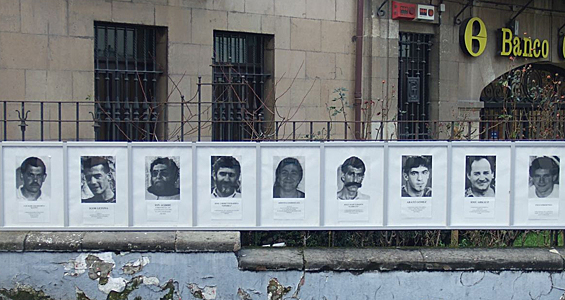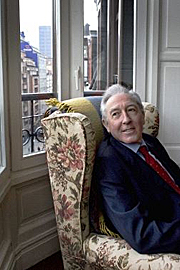Scene set for historic Basque poll
Ruling nationalist party may lose power for first time in 29 years in Sunday’s election.

 |
| Posters of Eta prisoners displayed in the main square of the town of Mondragon |
The political landscape of the Basque Country looks set to change drastically this Sunday, when nearly 1.8 million registered voters could put the ruling moderate Nationalist Basque Party (PNV) out of power after 29 years at the helm of this prosperous Spanish region.
Electoral polls are all predicting that the PNV and its coalition partners will lose its absolute majority and are unlikely to lead a future government for the first time since 1980 when the Basque Country regained its own parliament, soon after the transition to democracy in Spain.
The consequences of the political change in the Basque conflict, the only remaining “terrorism” hotspot in Western Europe, could be enormous.
A non-nationalist coalition of the Socialist and Conservative parties is said to be the leading option among the electorate.
Despite the fact that they are the governing party and the main opposition party in Madrid respectively, the uniqueness of the Basque situation could bring them together to share power.
Much of that uniqeness is down to Euskadi Ta Askatasuna, which stands for “Basque Homeland and Freedom” in the Basque language and was founded in 1959.
The group has been responsible for at least 850 killings and committed dozens of kidnappings during its campaign for an independent state.
Now, following rulings by the Spanish supreme court, political parties with alleged links to Eta have been banned from Sunday’s election.
Bodyguard protection
A recent documentary by Iñaki Arteta, the Basque filmmaker, aptly titled The Basque Hell, claims that more than 200,000 Basques (almost 10 per cent of the region’s 2.2 million population) have left the region since 1985.
The documentary blames the exodus on the violence and threats, and marginalization of people in their own workplaces, from the radical nationalists linked to Eta.
 |
| Arregi attacks the ‘hypocrisy of moderate nationalism’ |
Joseba Arregi is a disenchanted nationalist and well known academic who speaks Basque at home with his children, but who needs the protection of bodyguards when walking around the streets of his hometown of Bilbao.
Arregi said: “It is impossible for a visitor to the Basque Country to understand why there is terrorism here.
“We have a very high quality of life, social and cultural development is higher than in the rest of Spain, we run our own police, health, education, and we don’t even pay taxes directly to the central government.
“In sum, we enjoy the highest level of self government of any region in Western Europe”.
Arregi’s numerous articles attacking the hypocrisy of moderate nationalism and the “terror” of the radicals have made him a target of Eta.
He hopes that a defeat of the nationalist parties will put an end to the increasing division of Basque society by moving away from questions of self government, culture and identity, to the more pressing issues that affect the lives of the Basques like the economy, health and education.
Parties banned
Even though it is very difficult to establish, the standard division of Basque society used by many sociologists is one where around 15 per cent see themselves as exclusively Basque, another 15 per cent as only Spanish, and the remaining 70 per cent as both Basque and Spanish in different degrees.
 |
| Amutio fiercely defends the Basque Country’s independence |
Aitor Amutio, a lawyer from the iconic town of Guernica, is one who clearly sees himself as just Basque, and fiercely defends the region’s independence.
He points out that he is unable to vote for the political option that best represents his interest, a radical nationalist party called D3M, which has been banned in standing in the election by Spain’s supreme court for its alleged links to Eta.
“I feel Basque. We have a unique culture and language which will only flourish in an independent state,” says Amutio.
He believes that the right to self determination is essential, and that is the root of the political conflict that exists in the Basque Country.
“There is anger, and there clearly is a problem. Now, whether violence is justified or not, that’s a different matter”, Amutio says.
Madrid control
Many of the supporters attending a political rally of Juan José Ibarretxe, the Basque president, whose PNV party Arregi is hoping will lose, seem pleased with the social and economic policies of their leader as I watch them gather in the regional capital of Vitoria.
They say the policies are similar to those of Scandinavian countries, but they can’t resist going back to the issue of Madrid versus Vitoria.
“What is at stake in these elections, I believe, is the continuity of the politics of dialogue [with Eta] defended by Ibarretxe, or a return to more conflict if the Socialists win” says PNV voter Carlos Caballero, as he watches his leader greeting some of his supporters inside a sports hall.
In Caballero’s opinion, the Basque Socialists don’t want to look for a solution through dialogue as happened in Northern Ireland.
“They only take instructions from Madrid” he says.
Dialogue difficult
The ninth Basque parliament that will be formed after Sunday’s elections will be the first one where the Basque radical parties will not be present, after the supreme court’s ruling.
Their past performances have gone from a low of 10 per cent in 2001 to a high of 18 per cent in the 1990 elections.
It is impossible to know how many of the 300,000 or so “abertzales” [a Basque word to refer to a patriot or lover of his/her country] defend violence in order to achieve their goals.
From next week, this group of people will no longer have political representatives in the main Basque political institution.
Dialogue will now be more difficult, and the new government, likely to be led by the Basque Socialist party, the party Caballero says “takes instructions from Madrid,” have said they will not talk to Eta until they stop the killing.
This is a tougher and new approach within Basque regional politics.
If Eta is forced to stop killing in the absence of any institutional voice, then Sunday’s elections could prove to be a turning point in the Basque Country, and it will be for the better.